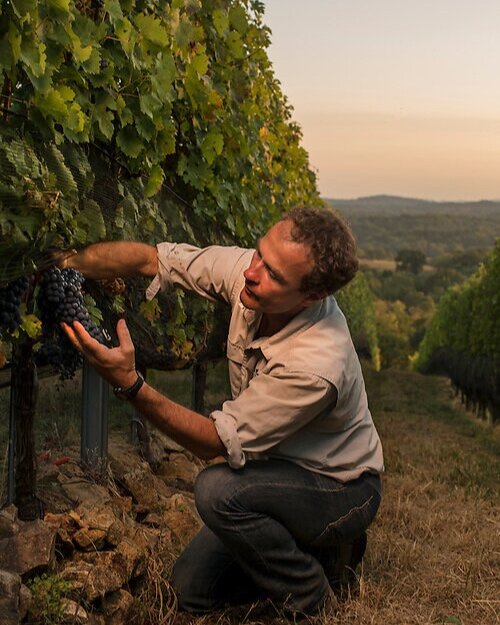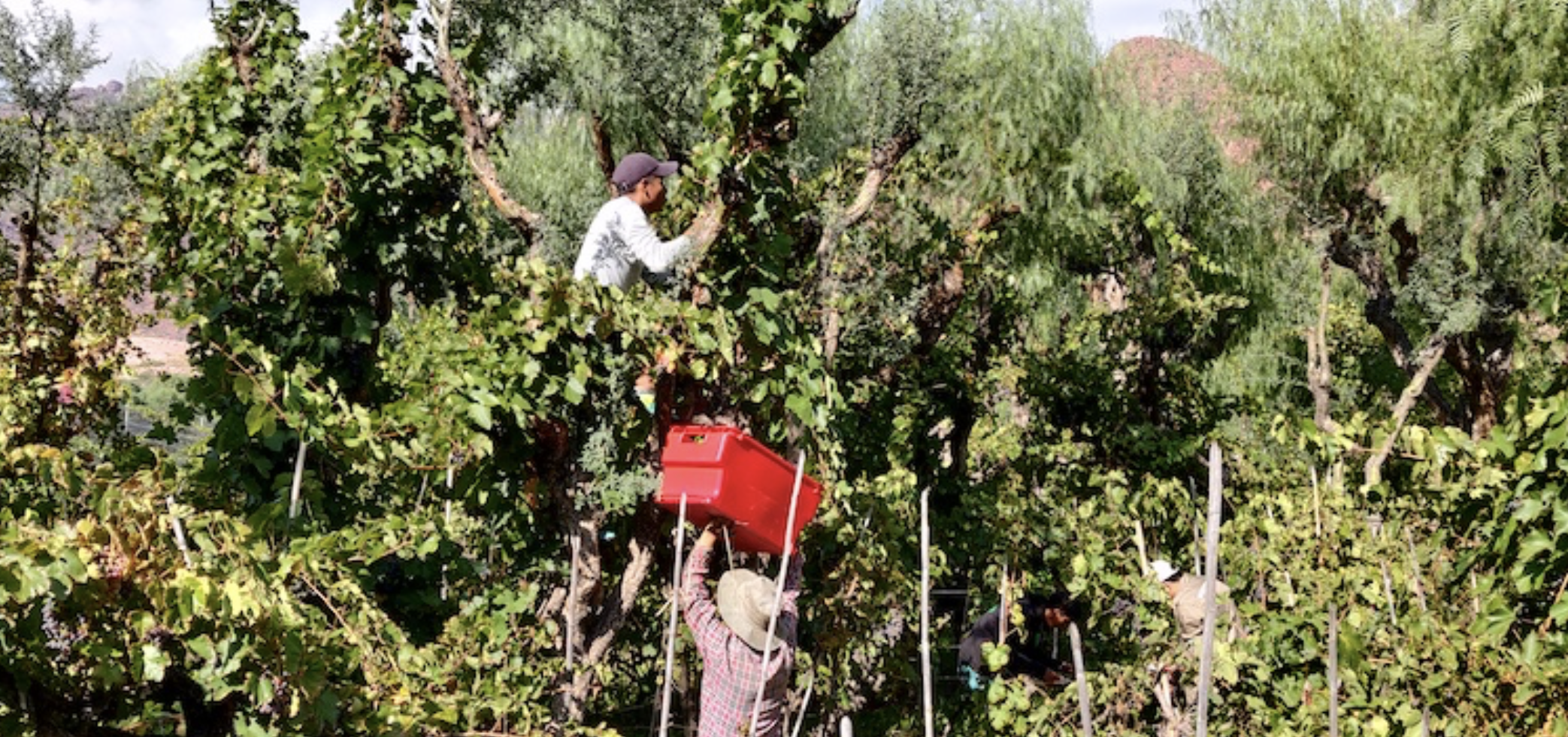Katie Jones - Owner & Winemaker working at Domaine Jones
Making old vine heritage matter to consumers.
Making old vine heritage matter to consumers
Katie Jones moved from the UK to live and work in Languedoc many years ago. But it wasn't until 2008 that she took the plunge and bought her first vineyard. Several vintages later, and Domaine Jones is producing exceptional wines from very old vines and (exceptionally small yields) in and around the village of Tuchan, in rural South of France.
With old vines aged from 50 to 116 years old , Jones is able to make single varietal unusual wines like Carignan Gris and Macabeu and the Hairy Grenache (a hairy leafed Grenache aka Lledoner Pelut) - really giving the vine variety the limelight.
Jones says that if anyone else had bought these vines they would have ripped up the vineyards and planted younger more vigorous vines. ‘They are the stray dogs that no-one else wants’
Through Jones’ virtual vineyard rambles on instagram live throughout lockdown and via her recent Adopt an Old Vine Scheme, (round two goes live this week) Katie Jones has been able to show her followers first-hand what old vines mean for a winemaker, for the community and for the end product.
‘Old Vines represent such a large part of our history, they tell a thousand stories of the people who have worked with them over the years and the people who have enjoyed wines from their fruit. They need more care and attention, but it is worth it for the quality and style of wine that they produce.’
‘The Old Vines project is a fantastic initiative, helping to encourage a long term awareness, a commitment. Until I showed people my old vines they didn’t understand what it meant to write ‘old vines’ on a wine label.’ Unless you show it and explain it, people don’t get it. Wines from old vines get better with time.’
Jean-Philippe Roby - Associate Professor working at Bordeaux Sciences Agro and ISVV
Cultivating the old vines of the future.
Cultivating the old vines of the future
Jean-Philippe studies and projects focus on the cultivation of young vineyards (from the moment of grafting and early years) to protect genetic diversity and ensure long-lived vines. He advocates for the applied preservation of old vines and diverse varieties ‘live’ in commercial vineyards, rather than in museum conservatories. He argues that if the world of wine were to dedicate just 5% of any wine region’s vine area to plantings of biodiversity and genetic richness, it would be enough to safeguard this endangered heritage for the future.
Jean-Philippe Roby is an associate professor, teacher and researcher at Bordeaux Sciences Agro and ISVV (Vine and Wine Scientific Institute of Bordeaux) since 1998. He teaches viticulture on training system, and adaptation of plant material to pedo-climate, including economic aspect.
He has been the head of Viticulture-Oenology department from 1998 to 2009, and Head of Innovation and Transfer department of ISVV until 2016. He his now director of publication of IVES (International Viticulture and Enology Society), running OENO-One, scientific peer reviewed journal and IVES Technical Reviews, both in full Open Access. Jean-Philippe is also consultant for vineyards and wineries in several wine countries.
He is part of the cross-border Vites Qualitas (http://vitesqualitas.eu/en/home/) project (funded by Poctefa.eu) to increase the longevity of vineyards through the study of pruning and grafts.
He has been the head of Viticulture-Oenology department from 1998 to 2009, and Head of Innovation and Transfer department of ISVV until 2016. He his now director of publication of IVES (International Viticulture and Enology Society), running OENO-One, scientific peer reviewed journal and IVES Technical Reviews, both in full Open Access. Jean-Philippe is also consultant for vineyards and wineries in several wine countries.
He is part of the cross-border Vites Qualitas (http://vitesqualitas.eu/en/home/) project (funded by Poctefa.eu) to increase the longevity of vineyards through the study of pruning and grafts.
His studies and projects focus on the cultivation of young vineyards (from the moment of grafting and early years) to protect genetic diversity and long-lived vines. He advocates for the applied preservation of old vines and diverse varieties ‘live’ in producing commercial vineyards, rather than in museum conservatories. He argues that if the world of wine were to dedicate just 5% of any wine region’s vine area to plantings of biodiversity and genetic richness, it would be enough to safeguard this endangered heritage for the future.
Nayan Gowda - Winemaker & Consultant to Jardin Oculto
Regenerative agriculture through 200 year-old arboreal vines in Bolivia.
Regenerative agriculture through 200 year-old arboreal vines in Bolivia
While Bolivian vineyards were established by Spanish missionaries in the 1600s, this is a country little-known in export wine markets. Contemporary production is dominated by international (French) varieties, despite the local, old varieties still tended in rural communities. María José Granier created Jardín Oculto (Secret Garden) to recuperate unique old vines many of which are co-planted with native trees. (A practice that provides a natural trellising system, and protects against pests and diseases.) The culture and harvesting rely on local knowledge and farming communities, who were being paid a low price for unique grapes without a place in the conventional Bolivian wine scene. She retained flying winemaker Nayan Gowda to join the project, and make a range of wines from Muscat of Alexandria, Vischoqueña, and Negra Criolla. The first vintage is soon being exported to the USA, and the viability of these unique old vines has been reframed.
Jardín Oculto aims to help preserve the viticultural heritage of Bolivia by making the old vine plantings commercially viable; by working with the growers to improve their management of the vines; and by raising the profile of these vines amongst the international community.
Nayan Gowda is an itinerant winemaker of curiosity and open mind who has worked around the world, from Australia to Norway and Kazakhstan. He combines winemaking and viticultural expertise with business and marketing insight. Nayan’s clients have included large brand-driven wineries in Europe, Australia and South Africa with boutique producers at the new frontiers or overlooked corners of wine. His current project is making wine for Jardín Oculto in Bolivia.
Brigitte Chevalier - Owner & Winemaker working at Domaine de Cébène
Domaine de Cébène is a founding sponsor of The Old Vine Conference.
The humanity of old vines in Languedoc
The owner and winemaker, Brigitte Chevalier, moved from a first career in wine exports when she was able to buy (after much searching) a small plot of ancient Carignan planted on and adapted to schist. She has been a resolute champion of indigenous old vine plantings in Faugères, which she sees as part of the priceless patrimony of a region under constant pressure to adopt the latest wine trend. Her experience with old vine adoption schemes show one approach to making this patrimony resonate with consumers. “These days, so many of the vine adopters are young people”, she says, “they seek me out.”
Dr Laura Catena - Working at Catena Zapata
Old vines for new vineyards
Old vines for new vineyards
A dedicated but unsentimental advocate for viticultural heritage, Laura Catena discusses the challenges and rewards of Argentina’s old vine Malbec. Keenly aware of the cultural and qualitative value of ancient vineyards, Laura is leading projects to preserve and amplify their genetic material though new vineyards planted from old vine material. “We do not yet know”, she says, “how this genetic material could be the answer to the climate change and diseases of the future. But we do know that we shouldn’t let it disappear.”
Dr. Laura Catena is a fourth generation Argentine vintner, physician and author. Catena was born in Mendoza and spent her childhood with her grandfather Domingo at the family's winery in the small village of La Libertad. Laura graduated magna cum laude from Harvard University in 1988 and has a Medical Doctor degree from Stanford University. In 1995 Laura joined her father Nicolás Catena Zapata at the family winery and founded the Catena Institute of Wine with the vision of making Argentine wines that could stand with the best of the world.
She is currently managing director of Bodega Catena Zapata and works closely with Alejandro Vigil and Luis Reginato to make the vineyard selections and blends for the family's wines. Laura is also founder of her own Luca Winery in Mendoza, Argentina, as well as a practicing part-time physician of Emergency Medicine in San Francisco. Laura splits her time between Mendoza, Argentina and San Francisco, California.
Laura is recognized internationally as the “face” of Argentine wine for her active role in promoting the Mendoza wine region and Argentine Malbec. She is author of Argentina’s definitive wine guide, “Vino Argentino” published by Chronicle Books in 2010. Laura’s second book, Gold in the Vineyards, a beautifully illustrated compilation of the world’s most celebrated vineyards, was released in North America and Europe in March 2020. Originally published in 2017 by Catapulta in Spanish, Portuguese and English, it was voted “Best in the World for Wine History” by the Gourmand Cookbook Awards, and received positive reviews in Forbes, The Washington Post, The Drinks Business, Decanter and The Wine Economist.
Laura has been featured in The Oprah Magazine as one of the World’s Top Women Vintners in October 2010. Her work has appeared in the The New York Times, The Wall Street Journal, Food & Wine, La Nación, Decanter and The Economist 1843 Magazine in an article about the Catena Institute titled “Argentine Wine’s Premier Cru.”
Dylan Grigg - Old Vine Researcher & Founder working at Meristem Viticulture
Mythbusting and mysteries: the effect of vine age on yield, wine quality and epigentic adaptation.
Mythbusting and mysteries: the effect of vine age on yield, wine quality and epigentic adaptation.
Australian Dylan Grigg has been involved in viticulture for more than 20 years. Through his consulting company, Meristem Viticulture, he has worked with large and small businesses in Australia and beyond. For The Old Vine Conference Dylan will discuss his doctoral thesis on the influence of grapevine age on vine growth and wine quality. Dylan’s findings challenge the convention that old vines equal uneconomically low yields. His findings on epigenetics suggest that old vines are a vital source of genetic robustness for the future of wine. He believes that further research is essential.
Link to Dylan’s thesis: https://digital.library.adelaide.edu.au/dspace/handle/2440/113314






